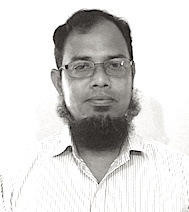 Md. Siddiqur Rahman
Md. Siddiqur Rahman
Upazila Nirbahi Officer (Chief Executive Officer)
Office of the Upazila Nirbahi Officer, Kishorganj, Nilphamari
Public Policy Program (’10)
Please tell us about your career path so far. What is your area of specialization and how did you come to work in this area?
I started my career as banker, just after completion of my masters’ degree in 1999. I was working as officer grade-1 in a private bank named National Credit and Commerce Bank Limited. In 2003, I joined the Bangladesh Civil Service (Administration) Cadre under the Ministry of Public Administration where I was working as Assistant Commissioner and Magistrate in three districts between 2003 and 2007. At the end of 2007 I was posted as Assistant Commissioner (Land) in Chatmohar, then Bera Upazila under Pabna District and later as Upazila Nirbahi Officer (UNO) in Khetlal under Joypurhat District. In October 2009, I was lucky to get an opportunity to study at GRIPS. On my return a year later I joined the Bangladesh Public Administration Training Center (BPTAC) – the apex training center in Bangladesh – as Deputy Director. In March 2014, I was transferred as UNO Kishoreganj Upazila – my present work place – under the Nilphamari District in the northern part of Bangladesh.
The area of my specialization is public administration. I work on poverty alleviation, land management, education, law and order situation and various types of development activities. Training on Total Quality Management, particularly Kaizen, and studying at GRIPS has induced me to work in a better way and developed a strong conviction to help improve the living conditions of our citizens.
You are currently Upazila Nirbahi Officer (CEO) under the Ministry of Public Administration. What are your main duties and responsibilities?
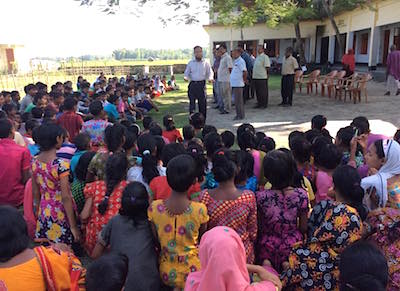
Raising awareness of the importance of attaining 100% literacy in Kishoreganj and motivating students to study hard.
As Upazila Nirbahi Officer (UNO) I am the Chief Executive Officer of the Upazila Council in the Nilphamari District. It is my responsibility to coordinate among the 17 departments that have been handed over to Upazila Council, which is headed by an elected Chairman. Other than the 17 departments there are some more departments that work as per guidance of the line department and central government and I am to coordinate among all these departments as an officer of the central government. Implementing government policies, acts, ordinances, rules, orders, circulars, time-to-time directives etc. also falls under my responsibility. As does land management and the implementation, monitoring and evaluation of certain development and other projects, and reporting about these to the higher authorities. Maintaining good law and order in my work place is also part of my duties as I also work as Executive Magistrate. Furthermore, I act as drawing and disbursing officer and supervise activities of the staff working under me.
You have recently been playing a prominent role in some “Kaizen in the Public Sector” projects in Bangladesh. Please tell us about these projects and your role in there.
In 2009, I completed a course named “Improving Public Service Delivery through Total Quality Management (IPS-TQM)”, organized by the Japan International Cooperation Agency (JICA) and the Bangladesh Public Administration Training Centre (BPATC). The concept of Kaizen, introduced by Japanese management guru Masaaki Imai in 1986, is the practice of small changes for betterment or continuous improvement. It has inspired me to work for positive change. There are many things we can do in a better way, without needing any extra financial resources or approval from our higher authorities. One year studying in GRIPS and living in Japan has further enhanced my inspiration to work hard for our lovely country. After returning to Bangladesh, I had the opportunity to work for the poor people indirectly. While I was in BPATC I was working as module director of the Village Study Module. Through this module, we were sending newly recruited civil officers on a four-months training course to visit ultra-poor families or disadvantaged citizens to see and internalize their socio-economic conditions. The participants were instructed to identify the problems of the poor families and take initiatives to solve at least a few of them with the help of the local government administration within their seven days village attachment. After 3 years and 6 months, in March, 2014, I was transferred as UNO Kishoreganj, Nilphamari. After joining as UNO it was my turn to do something directly for the poor people. I noticed the presence of numerous street beggars in our office area, around education institutions, markets, mosques, roadsides and people’s residences. Their numbers seemed substantially higher than in other regions of the country. The presence of higher number of beggars, their humiliating professions and vulnerable conditions induced me to seriously look into the problem. To address the problems, I recalled the training in BPATC on Improving Public Service Delivery through Total Quality Management (IPS-TQM). Kaizen is an important tool to improve the situation so I would like to mention 5 Kaizen projects we have recently implemented here.
Kaizen 1: Making Kishoreganj Upazila Beggar-Free
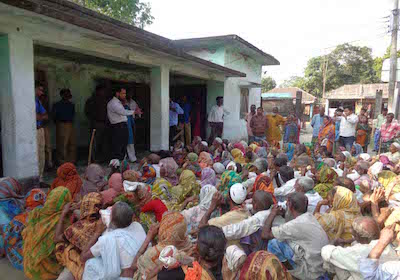
Siddiqur motivating street beggars to start working instead of begging.
First, we conducted a survey through which we identified 979 street beggars, and assessed their needs. Second, we launched a campaign to drum up public support for making a beggar-free upazila and to mobilize funds locally. Third, we distributed materials among the street beggars regarding possible income generating activities. Fourth, we ensured that they would be covered by our social safety net programs (the major safety net programs are: Aged, Widow and Disabled allowances by Directorate of Social Service; Vulnerable Group Development by Directorate of Women Affairs; Employment Generation Programs for the Poorest and Vulnerable Group Feeding by Directorate of Disaster Management); Fifth, we made 951 rehabilitated beggars members of the “One House One Project” which is our honorable Prime Minister’s project for poverty alleviation. All members have money in their own bank account against which we provide them a loan to conduct small trading or other income generating activities. We are very proud that this upazila is now beggar-free, which is first ever in the history of Bangladesh.
Kaizen 2: Ensuring Quality Primary Education
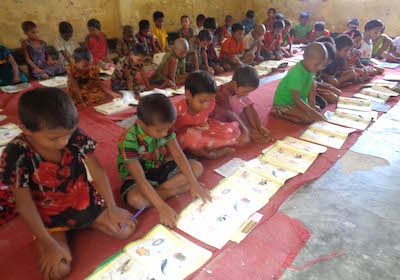
Children learning by doing in a primary school
Primary education is the foundation of all education. Enrollment is almost hundred percent but the quality of education is not up to the standard. There were many anomalies like late attendance of teachers and students and a shortage of learning materials. In some schools there were no co-curricular activities, no garden, and no congenial academic atmosphere. Together with the concerned officers and the leaders of the teachers association we formulated an action plan to ensure quality primary education. There are eight specific targets like reducing dropout to below 5%, and increasing attendance by 90%, or ensuring 15% A+ in primary school certificate examination. The targets are to be achieved by a plan of 27 actions on punctual attendance, the use of learning materials, teaching methodologies, co-curricular activities, model tests, class tests, competitive environment, awarding and rewarding etc. I am currently implementing the action plan together with Upazila Education Officer, Assistant Upazila Education Officer, all the teachers and the school management committee members. We are strictly monitoring the 169 schools by means of a random sampling and by taking corrective measures when necessary. As a result, substantial qualitative and quantitative changes are taking place. Our aim is to ensure quality education as well as Universal Primary Education, which is one of the United Nations Millennium Development Goals.
Kaizen 3: Ending Child Marriage
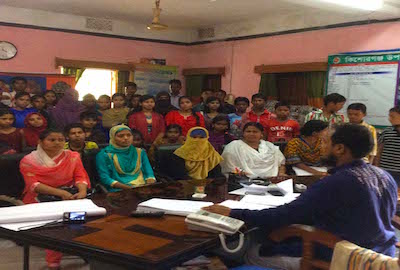
Motivating “Adolescent Club Leaders” to end child marriage
Child marriage is a common phenomenon all over Bangladesh but in our Kishoreganj upazila the rate is even higher than average. According to a recent survey, 43.6 percent of marriages involves underaged i.e. girls under 18 or boys under 21 years old in the Nilphamari District. Child marriage is an offence according to the Child Marriage Prevention act adopted in 1929. Based on the act we are trying to prevent child marriage. For example, from March 2014 to July 2015 we have prevented 141 child marriages. Moreover, we are campaigning against child marriage and creating awareness among the people. In public meetings we speak about the demerits and harmful sides of child marriage. Now people have become aware of it and the rate of child marriage has been reduced to 18% at present.
Kaizen 4: Establishing a Diabetics Hospital
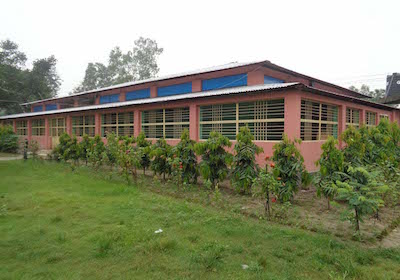
The newly established diabetic hospital
People in this locality are mostly poor. For medical treatment, they would often need to go to a district or division level hospital. However, due to the huge costs in terms of time and money, this is very difficult or impossible for many of the poor people. Against this backdrop we have implemented a Kaizen project to establish a hospital with special facilities to treat diabetic patients. The hospital, which we were able to set up at the cost of six million Bangladeshi taka (around 75k USD), is equipped with a laboratory that can conduct 29 types of tests, as well as X-rays, ECG ultrasound, and provide dental and eye care etc. Needless to say that people are very happy with the available the health service facilities.
Kaizen 5: Creating a Tea Garden
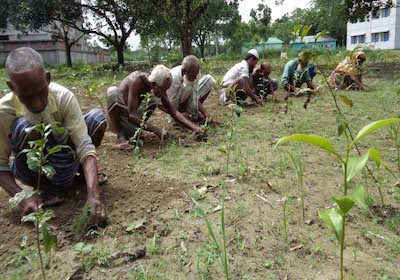
Rehabilitated beggars working in the Kaizen tea garden
One of the key characteristics of this upazila is high unemployment, resulting in a large number of poor people who were begging door to door. After the declaration of a beggar-free upazila we have been creating employment opportunities for the beggars in many ways. In our upazila campus we had a huge plot of barren land and decided to grow tea plants in an area of 2 hectare. Rehabilitated beggars receive a daily wage for taking care of the plants in the Kaizen tea garden. This is the first Kaizen tea garden in the district and people come from far and away to see the garden. Following our project as example, some rich people have also started creating tea gardens. I think this project will create more employment and accelerate economic and financial activities. We are well on the way for poverty to be drastically reduced and UN Millennium Development Goals to be achieved.
Kaizen 6: Increasing Sanitation Coverage
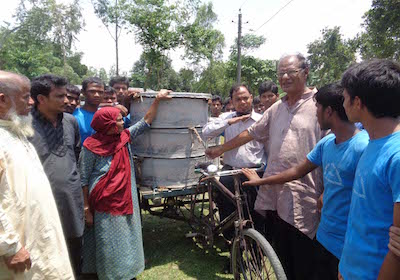
Sanitary latrines are being distributed to poor households
Sanitation is directly or indirectly related to MDGs goals. The sanitation coverage in this upazila is lower than in the rest of the country. The coverage was 62 percent according to a local survey report in June 2014. So 38 percent of the people do not have any sanitary latrine. It is a shame that in this day and (digital) age people still have to resort to open defecation. That is why our government has given top priority to increasing the sanitation coverage. Using government funds we provide latrine sets to the poor people who do not have enough money to buy themselves. At the same time, we are encouraging the middle-income and lower middle-income group to buy sanitary latrines at their own expense. Last year, our Divisional Commissioner Rongpur, called me the worst performing upazila when the coverage was 62%. Due to our recent initiatives, the sanitation coverage has increased to 80% at present. We have raised awareness among the people of the importance of sanitation and they are now motivated to reach hundred percent sanitation coverage.
In your current capacity, what do you see as the main opportunities and challenges for the Nilphamari District over the course of the next five to ten years?
There are many opportunities to find work for the citizens, particularly disadvantaged citizens, such as the Employment Generation Program for the Poorest (EGPP), the Vulnerable Group Feeding (VGF), Vulnerable Group Development (VGD), One House One Project etc. As UNO I can contribute to reduce poverty in the area by ensuring quality education, increasing sanitation, ending child marriage and executing other laws. Besides this, since I work as drawing and disbursing officer I have ample opportunity to build social and physical infrastructure like school buildings, roads, bridges, culverts, and drainage construction. Still, many challenges remain, the main ones being illiteracy, poverty, lack of proper education, lack of patriotic feelings, self-centric attitudes, degradation of moral values, corruption, over population, law and order situation, and political instability.
What are some of the biggest challenges you face in your work? And what have been the most interesting or rewarding aspects of your career thus far?
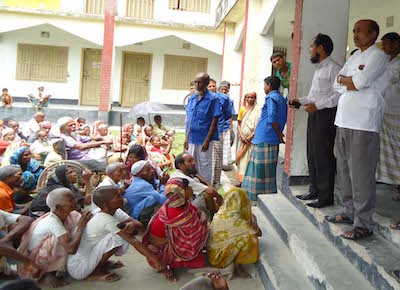
Thanks to the efforts of Siddiqur and his team Kishoreganj has become the first street beggar-free upazila in Bangladesh.
I cannot implement all the projects/programs as per law. In some projects the allocated budget is not spent for the target groups and work. The lack of proper education, the huge number of ultra-poor, backward communication, and undue interference are some of the biggest challenges. Despite these challenges, we have made our upazila the first street beggar-free, out of 489 upazila in Bangladesh. It is very interesting that high officials from Dhaka city are coming here to see the activities of the rehabilitated beggars. Also BPATC-JICA people came to visit the project and were very happy to see our result. BPATC-JICA awarded me as “Kaizen role model” in the International Kaizen Convention in December 2014. Our Deputy Commissioner mentioned this project to the honorable Prime Minister in Deputy Commissioner’s Conference last July. The government has also shown its appreciation and has instructed to replicate our experience in other upazila.
What led you to GRIPS? What is the most important thing you got out of your studies here, and how has your experience at GRIPS prepared you for future endeavours?
My senior colleague Mr. Md. Mohoshin Ali inspired me to apply to GRIPS. Then my batch mate and friend Md. Tamij Uddin Khan guided me through the process. GRIPS’ strategic planning and systematic admission procedure made me attracted to GRIPS. Congenial academic atmosphere, discipline, cooperation from professors and staff, learning and teaching methodology of GRIPS are some of the most important learning points. Moreover, punctuality, right use of time, the hardworking and law abiding attitude of the Japanese people, mutual respect, patriotic feelings, cleanliness, technological advancement etc. inspired me to apply this in my personal as well as service life.
I returned home with some intangible ‘free goods’ from Japan such as punctuality, discipline, hardworking, cleanliness and so on. These things are most important for me and while I was working in BPATC I shared my experience in Japan with the participants. And in field administration, wherever I get an opportunity, I mention about Japanese people, Japanese development and its mechanisms. So I am trying to apply my experience at GRIPS to develop my career and country.
What is your fondest memory of your time spent at GRIPS? And what do you miss about Japan?
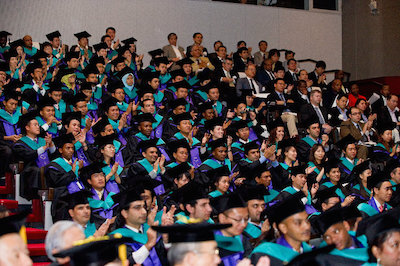
GRIPS Graduation Ceremony, class of 2009/10
The Welcome Party for International Students is one of my fondest memories, where international students introduced their countries and culture through singing, dancing and playing different instruments. Visiting Kyoto by bullet train (shinkansen) is my most memorable event. Also, a delegation of high-level officials from Bangladesh visited GRIPS and received a briefing from Professor Horie. Together with all Bangladeshi students we arranged a tea party for our delegation, which was a great opportunity to interact with each other.
Among the things I am missing are the use of high tech, Japanese development, the nice Japanese people and their punctuality, clean roads, stations, sophisticated buildings, cherry blossoms, flea markets, mobile shops, GRIPS forum, living in Odaiba and much more.
How do you maintain the balance between work and the rest of your life? What is your favorite thing to do when you are not working?
I try to complete my assigned duties and responsibilities as per rules and regulations. But only routine work is not sufficient to achieve the expected development in our country. Now I am trying to use my right brain and am thinking and working out of the box. Working hard makes me feel tired but when seeing the results, it is very satisfactory and I get a sense of accomplishment. Appreciation for a good job refreshes and makes me happy. It encourages me to work even harder. I think if I work now sincerely and honestly for the people, the rest of my life will also be fine and joyful. Even when I am not working I often think about how to initiate new ideas to make our people benefit.
If you could give one piece of advice to anyone considering studying at GRIPS what would it be?
GRIPS is an institute that is producing global leaders. It has adopted excellent learning and teaching methods, as well as evaluation systems that are up to international standards. The study tours organized by the school are very attractive while the GRIPS Forum offers a wonderful platform to learn and interact. Considering all this, I would recommend any eligible international candidate to try and get admission to GRIPS. They should enjoy its facilities and learn from GRIPS as much as they can and take advantage of the ample opportunities GRIPS has to offer.
How would you like to maintain involved with the School? What do you expect from GRIPS as an alumnus?
The alumni network is a good platform to keep in touch with fellow students and the School. The GRIPS Alumni Office is sending a lot of valuable information to the alumni which is very helpful. I would like to know about every event held at GRIPS through facebook, email or website. I wish alumni could be invited to GRIPS to refresh their knowledge.
Do you have any suggestions on how to further utilize the GRIPS alumni network?
I must congratulate Karin-san for her good efforts. Recently I visited Thailand and I met our friend Jacky, deputy director of police with the help of the GRIPS alumni network. The procedure of updating and sharing the information in the online alumni database might be made more user-friendly.





